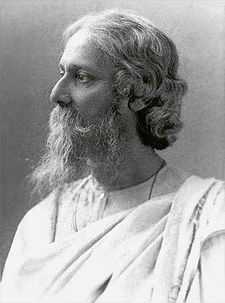Kabuliwala (1961 film)
| Kabuala (1961) | |
|---|---|
 Film poster | |
| Directed by | Hemen Gupta |
| Produced by |
Bimal Roy Leela Desai (assoc.) |
| Written by |
Vishram Bedekar S. Khalil Rabindranath Tagore (story) |
| Starring |
Balraj Sahni Usha Kiran Sajjan Sonu. |
| Music by | Salil Choudhury |
| Cinematography | Kamal Bose |
| Edited by | Madhu Prabhavalkar |
Release dates | December 14, 1961 |
Running time | 134 min. |
| Country | India |
| Language | Hindi |
Kabuliwala (Hindi: काबुलीवाला) is a 1961 Hindi film based on a story, Kabuliwala, written by the Bengali writer Rabindranath Tagore. It was directed by Hemen Gupta, who had remained private secretary to Subhas Chandra Bose, and went on to direct many films including, Taksaal (1956), also starring Balraj Sahni, and his tribute Netaji Subhas Chandra Bose (1966).
The film starred Balraj Sahni, Usha Kiran, Sajjan, Sonu and Baby Farida.[1][2]
Background
The most successful adaptation of a Tagore story outside Bengal was Hemen Gupta’s Kabuliwala, produced by Bimal Roy, starring the veteran actor Balraj Sahni. The simple story of Kabuliwala is about the affection between Abdur Rehman Khan, an Afghani immigrant dry-fruit-seller in Calcutta and Mini (Sonu), a young girl who he imagines as his child-figure in memory of his daughter, Amina (Baby Farida), left behind in Kabul.
This story, unlike many other Tagore-inspired-films that are more strongly rooted in context and period, offers a more classical perspective on humanism, identify and difference. Tagore’sKabuliwala was published as a short story in Sadhana, a Bangla literary magazine he edited through the 1890s and the early decades of the twentieth century.
The story was translated from Bangla into English by the Irish woman Margaret Elizabeth Noble, more popularly known to the world as Sister Nivedita, and published in the Modern Review.[3]
Summary
Abdur Rehman Khan (Balraj Sahni), a middle-aged dry fruit seller from Kabul (Afghanistan), comes to Calcutta to hawk his merchandise and befriends a small Bengali girl called Mini who reminds him of his own daughter Amina back in Afghanistan. He puts up at a boarding house along with his countrymen. Since he is short of money he decides to sell his goods on credit for increasing his business.
Later, when he goes to collect his money, one of his customers abuses him and in the fight that ensues Rehman warns that he will not tolerate abuse and stabs the man when he does not stop the abuse. In the court Rehman's lawyer tries to obfuscate the facts but in his characteristic and simple fashion Rehman states the truth in a matter of fact way. The judge, pleased with Rehman's honesty, gives him 10 years' rigorous imprisonment instead of the death sentence.
On the day of his release, he goes to meet Mini but discovers that she has grown up into a woman and is about to get married. Mini does not recognize Rehman, he realises that his own daughter must have forgotten him too. Mini's father gives Rehman the money for travelling back to Afghanistan out of Mini's wedding budget to which Mini agrees; she also sends a gift for Rehman's daughter. The film ends with Rehman travelling back to his homeland.
Soundtrack
Music – Salil Choudhury; Lyrics – Prem Dhawan, Gulzar
- Aye mere pyaare watan – Manna Dey (Lyrics: Prem Dhawan)
- Ganga aaye kahan se – Hemant Kumar
- Kabuliwala – Hemant Kumar, Usha Mangeshkar
- O ya qurbaan – Mohammed Rafi
References
- ↑ "Of Kabuliwala and Unconditional Love", by Dinesh Raheja , Rediff.com.
- ↑ Kabuliwala New York Times.
- ↑ "From Kolkata to Dublin via Kabul: Tagore’s Internationalism And Cinema". Silhouette Magazine & Learning and Creativity. 2014-05-25. Retrieved 2014-05-27.
External links
| ||||||||||||||||||||||||||||||||||||||||||||||||||||
